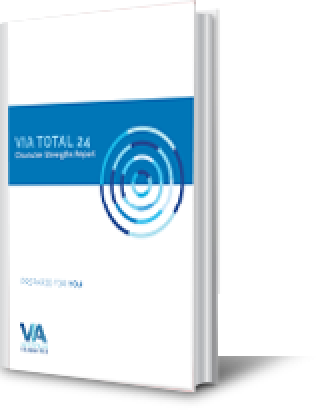Self-Regulation
"I manage my feelings and actions and am disciplined and self-controlled."
Become Aware Of Your Strength

What is Self-Regulation?
Self-Regulation is a complex character strength. It has to do with controlling your appetites and emotions and regulating what you do. Those high in self-regulation have a good level of confidence in their belief that they can be effective in what they pursue and are likely to achieve their goals. This sense of achievement is often associated with strong emotional self-regulation and the ability to remain calm in the face of challenge.
They are admired for their ability to control their reactions to disappointment and insecurities. Self-regulation helps keep a sense of balance, order, and progress in life. It can influence how we engage with the world and adapt to change. Self-Regulation can be viewed as a resource that can be depleted and fatigued. A useful metaphor can be that self-regulation acts like a muscle, which can be exhausted through over-exertion or strengthened through regular practice. Even small wins, like practicing patience or modeling a calmer behavior in a tough moment, can contribute to long-term growth
Practical Ways to Build Self-Regulation
Self-regulation can be strengthened through intentional exercise and daily actions. Try these approaches to increase your ability to pause, reflect, and act with purpose:
Set micro-goals. Breaking larger tasks into smaller steps helps reduce stress and build momentum through consistent effort.
Use time buffers. Adding a short pause before responding to emotional triggers builds control and supports emotional consistency.
Monitor behavior patterns. Keeping a log of when your self-regulation feels strong or depleted can help you determine what environments or routines support your efforts.
Practice mindful transitions. Use brief breathing exercises between tasks to reset your attention and energy.
Create cues. Visual or physical reminders can act as grounding strategies to redirect impulsive urges toward thoughtful choices.
These practices are simple but important in helping self-regulation become a steady, internal resource, not just a reaction to stress or temptation.
How Self-Regulation Impacts Daily Life
This strength shows up in small moments throughout the day:
Choosing to scroll past a heated comment instead of replying impulsively
Finishing a workout when quitting feels easier
Sticking to a budget instead of making a spontaneous purchase
Taking a few breaths before speaking during a tense conversation
Each of these choices reflects self-regulation in action, not perfection, but awareness and control. Over time, these decisions shape habits, relationships, and a sense of self-trust.
Which Virtue Is This Strength?
Self-Regulation is a strength within the virtue category of temperance, one of six virtues that subcategorize the 24 character strengths. Temperance describes strengths that help you manage habits and protect against excess. The other character strengths in Temperance are forgiveness, humility, self-regulation, and the prudence character strength.
Temperance

Explore and Apply Your Strength
Research findings indicate people with high self-control report fewer symptoms of anxiety and depression, are better able to control anger, and generally get along better with people. Self-regulation is linked with better personal adjustment, such as having fewer physical and psychological problems and having a greater sense of self-acceptance and self-esteem in relationships.
Learn how to activate this strength and all of your other character strengths with your personalized Total 24 Report, an assessment tool that can help you determine where self-regulation and other traits fit in your unique character profile.
Learn More